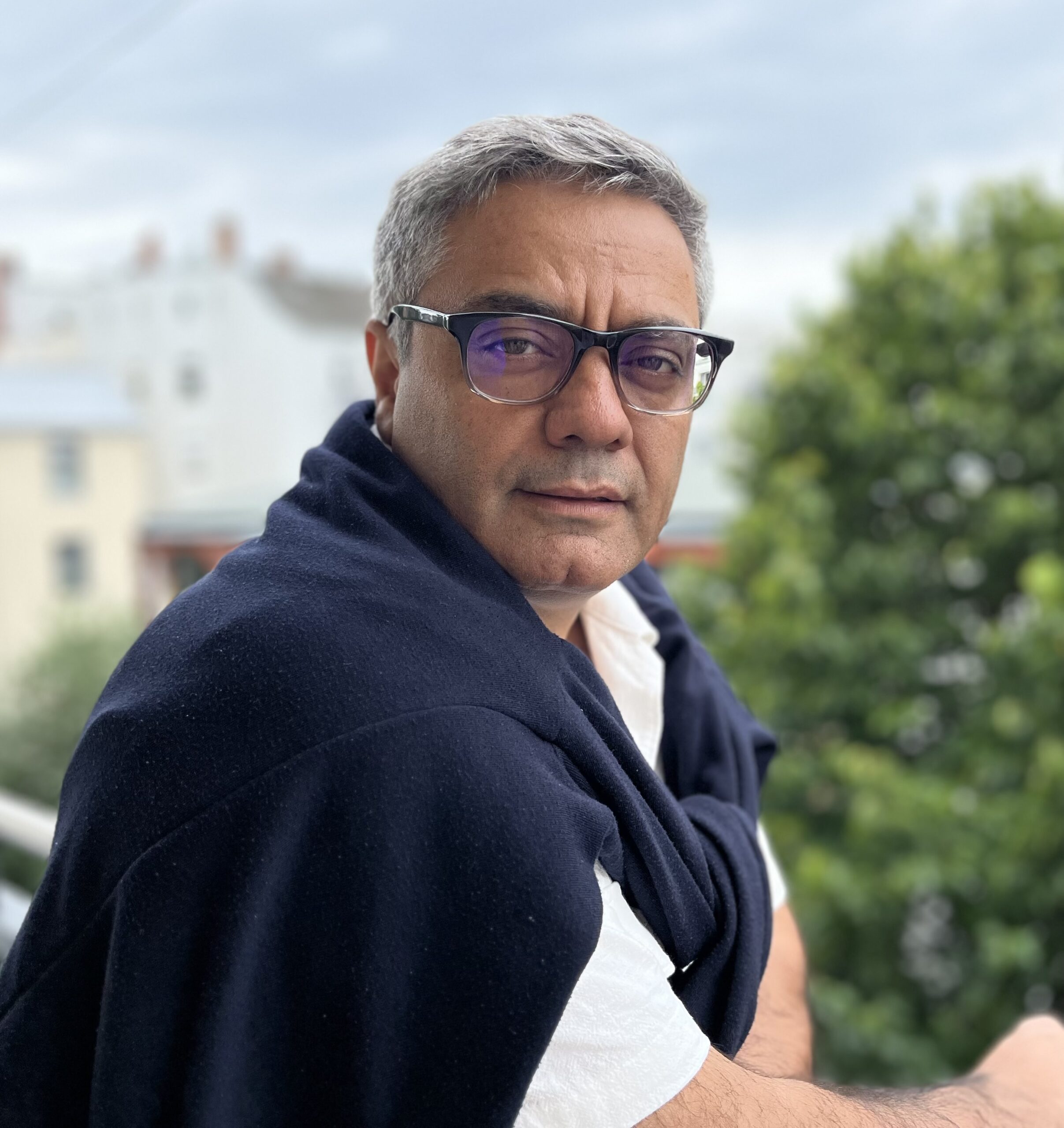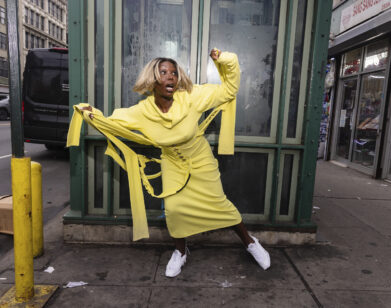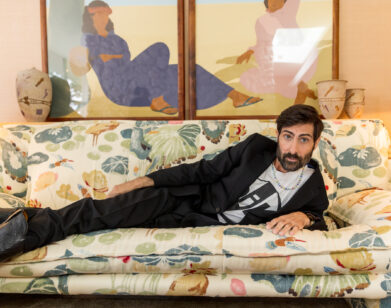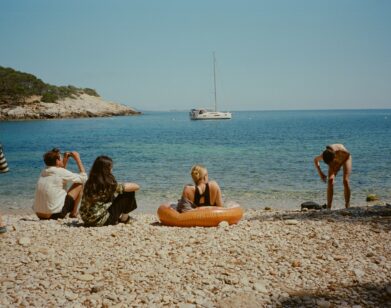DIRECTOR
How Director Mohammad Rasoulof Made One of the Year’s Defining Films in Secret
The Seed of the Sacred Fig premiered at this year’s Cannes with a harrowing backstory. Director Mohammad Rasoulof, previously arrested, censored, and censured in Iran multiple times for films like 2017’s A Man of Integrity and 2020’s There Is No Evil, barely made it to the festival. Facing a prison sentence for his work for its staunch criticism of the Iranian government, the filmmaker was forced to escape his native country.
Made entirely in secret to evade a previous legal ban that prohibited Rasoulof from making any films, The Seed of the Sacred Fig finds a synecdoche for the relationship between a state and its people in the dynamics of a single family. Patriarch Iman (Missagh Zareh) is a pious man elevated to a judgeship in 2022, just as the mass feminist protests sparked by the death of Mahsa Amini begin to swell. At work he finds himself signing off on death sentences without reading the cases, while at home his wife Najmeh (Soheila Golestani) struggles to manage the increasing restlessness of their daughters, Rezvan (Mahsa Rostami) and Sana (Setareh Maleki), who are driven further into rebellion. Rasoulof, one of several high-profile directors who have continued to produce films despite their official bans from the state, is part of a growing movement of underground filmmakers in Iran, including Jafar Panahi, who’s also been arrested and jailed on several occasions. Now, as The Seed of the Sacred Fig reaches theaters around the world, Rasoulof faces a future in exile. Ahead of the film’s US release, we sat down together at the offices of the distributor Neon. With the assistance of translator Iante Roach, we talked about the logistics of filming in secret and Rasoulof’s continued attempts to understand the authoritarian mindset.
———
DANIEL SCHINDEL: Could you start with a summation of all the different times your filmmaking and activism has gotten you into some kind of legal trouble?
MOHAMMAD RASOULOF: I was arrested for the first time in 2010 with Jafar Panahi while we were filming together on set. I was sentenced to one year in prison on charges of attempts against natural security, but the sentence was not enacted. In 2018, I was sentenced again for my film A Man of Integrity to one year in prison. And this is, of course, while my previous sentence had not yet been enacted. In 2020, they decided to enact these two sentences together, but then because of COVID, it was all procrastinated. In 2022, I was arrested again for the film There Is No Evil and all my other activities. I was placed in solitary confinement for five weeks. It’s a normal Iranian procedure; they were researching a new case against me. When they finished their searches, they put me into the general section of the prison, where I was doing time for the previous convictions. I was given an eight-year prison sentence, and that’s when I left Iran.
SCHINDEL: I understand that when you were in jail was when you had the idea for this film, when you learned about the “Women, Life, Freedom” movement.
RASOULOF: So there are two main sources of inspiration. The first one is much older, and has to do with the last 15 years, during which I was constantly dealing with people connected to the regime, trying to understand what kind of people they were and how they worked. In 2022, once I was in prison, I had to see people like that, so I had a lot to do with them. This was at the height of the “Women, Life, Freedom” movement. I had an encounter with a senior prison official who told me about the deep embarrassment and self-hatred he was experiencing, about how he was even thinking about suicide and about how fiercely his children criticized him. And at that point, I thought it would be very interesting to make a film about the story of a family like his, with this profound rift at its core, which of course represents what’s happening right now in Iranian society.
SCHINDEL: The portrait of the main character unites these two themes. It seems these people operate this way out of a sense of patriarchy. Is that something you arrived at through the process of writing, or did you hit upon that when you’re thinking about it and then build the screenplay accordingly?
RASOULOF: Initially, what really drew me to Iman [the lead character] was a desire to understand the depth of his psychological dimension and to really make sense of him. But then, as I moved forward, I realized that you could actually project the story of this family on a historical dimension of the history of Iran. And in fact, that’s what happened throughout the film, and that’s where it ends.
SCHINDEL: We know the normal process for a film production, but how does that manifest when you have to do it all in secret? How do you approach someone to produce and do things like casting under these kinds of restrictions?
RASOULOF: Well, everything has to happen in a very unorthodox way. Just to give you an example, you certainly can’t seek a producer before you’ve completed the filming, because no producer will come and give you money if they’re not sure that you can actually wrap the shoot. Of course, this is not my first underground film.
And the casting, again, is very complex, and it happens in a different way. This time, it was better than in the past because through the “Woman, Life, Freedom” movement, society was able to express openly its requests from the state and from the government. And the societal change, of course, also had an effect on the world of cinema, whereby a lot of film professionals decided no longer to work on projects that complied with censorship. For instance, lots of actresses decided no longer to come in front of the camera if they were to wear the compulsory headscarf. So this time around, we at least knew who it was possible to begin a conversation with, because they had clearly expressed where they stood. We chose the cast more or less among the people who’d taken a stance in this regard.
But it wasn’t as simple as just approaching someone from this group and saying, “Look, I want to make this underground film. Will you act in it?” This was a kind of negotiation undertaken by my close friends and collaborators, not me. They’d approach an actor and actress and tell them, “Look, we are working on a short film without permits and it’s the director’s first work. Would you like to take part?” And then if it seemed positive, you’d continue on these lines, like, “Well, it’s not just that we’re filming without a permit, it’s also that women are actually not going to wear the veil in the film, and it’s not exactly a short film.” Then if the actor wanted to know what the story was, we’d give them a one-page synopsis. Now, of course the synopsis was not an actual synopsis of the script, because that was too risky, but it gave a sense of the kind of risks that the film was taking. So it would give an actor a way to decide whether they wanted to be involved or not.
And you understand throughout this negotiation if this candidate is becoming more involved, if the relationship is going strong or if it’s falling apart. If things are falling apart, you can interrupt that relationship without having given away too much. But if the relationship grows stronger and the person is more keen, of course the time comes when they should know everything. But you have to begin these negotiations with a negative outlook or a pessimistic outlook, because it’s not only us being afraid of not giving things away. It’s also the other side thinking that maybe we’re regime agents trying to lure them into a trap. The deeper you go, the more dangerous it becomes for everyone involved. It’s a really lengthy process.
SCHINDEL: When it comes to locations, obviously you’re a bit limited, but there are some very striking ones. A lot of the film takes place in the apartment, so that was crucial. But there’s also the outdoor restaurant scene, which is something that would be easy for any normal film.
RASOULOF: I think when you become experienced in this line of work, you can work in any location but in a very specific way so you can make it work. [Rasoulof takes out his phone and shows me a series of different behind-the-scenes photos, demonstrating how many interior scenes from the film were shot on constructed sets — the same space, redressed each time.] Before, after. Before, after. The apartment, we built everything inside it, just to show you to what extent we controlled every tiny detail in each location.
But interestingly, the exterior shots in this film were easier for me, because the film is about a religious family and their visual appearance is very similar to what you see on Iranian state-controlled TV. So for instance, it was enough to have a fake permit for a short film and show them to the restaurant owner, and he’d let us film. We also had a plan B, so that the visual makeup of the cast and crew would actually never attract attention. Whenever the location allowed, I would come on set. It really depended on the location. But I directed often from a certain distance, without being physically present. Whenever strangers came up to the set, they were never particularly curious because it just seemed like a collaboration with the regime, really. Passersby even insulted our actresses, telling them to go to hell because they were collaborating with the regime.
But there was just one exterior shot in the film that was really difficult. And in fact, I think it only took us five minutes to shoot it, because we’d done a lot of prep. We’d rehearsed it pretty well. That’s when Iman is driving and he stops at a red light and looks out the window and sees this car driven by a young woman without a headscarf who looks like his daughter. We’d practice all the mise-en-scène, where the cars should exactly be and so on. And in the end, it was actually Mahsa Rostami, who plays the eldest daughter, who happened to also play that role, so she actually plays two roles. And basically, if someone rocked up or the police came, we’d immediately switch to filming what we were actually meant to be filming, as per the permit.
SCHINDEL: As you mentioned before, you’ve now made several films under these restrictions. Have you refined this process so that you don’t worry about missing any critical footage?
RASOULOF: It’s never clear. Because every time I actually watch one of my films, I’m always beating myself on the head, “Oh my god, why did you film that that way? Why didn’t you do this other thing?” But what I did learn is to be as flexible as I can when things do not work out the way I want. For instance, with my shot list, when editing, there’s always another way, although it might not be what I wanted. And I think creativity brings its own justice. So in other words, it comes to your aid, it saves you. Perhaps an audience member who’s watching the car chase scene has no idea what I thought for it, what I really wanted. But I know that I had other plans in mind and I was forced to film it that way. And each time I see it, I become so upset.
SCHINDEL: I suppose that’s the feeling many filmmakers have, regardless of the circumstances under which they made their films.
RASOULOF: Yes, you’re right.







